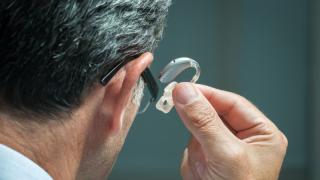Untreated Hearing Loss may lead to other Health Issues
Approximately 38 million Americans have hearing loss. Would it surprise you to learn that less than 20 percent of those people use hearing aids? According to the Hearing Loss Association of America, people typically wait about seven years to seek treatment after they start noticing the hearing loss. Why are people so reluctant to get help for a problem like hearing loss? And are there ramifications to waiting?

Posted by Casandra Lee in Hearing Aid Lifestyle
Approximately 38 million Americans have hearing loss. Would it surprise you to learn that less than 20 percent of those people use hearing aids? According to the Hearing Loss Association of America, people typically wait about seven years to seek treatment after they start noticing the hearing loss. Why are people so reluctant to get help for a problem like hearing loss? And are there ramifications to waiting?
In short, yes. There’s abundant research indicating that untreated hearing loss can raise a person’s risk of mental and physical health problems. In fact, uncorrected hearing loss leads to higher hospitalization rates and health care costs, according to research published in the Journal of the American Medical Association. The study analyzed health data from over 150,000 people aged 50 and older with age-related hearing loss but no hearing aid use. Researchers found that untreated hearing loss is associated with greater heart attacks, a 52 percent higher risk of dementia, a 41 percent higher risk of depression, and a nearly 30 percent higher risk of falls when compared with people with no hearing loss.
Why are these things connected? One factor is that hearing loss is frustrating, both for the people experiencing it and for their loved ones. A study conducted in 2009 revealed that hearing loss can be damaging to relationships. People with hearing loss can become socially isolated, not wanting to be around people as much or engage in conversation. What’s more, listening to people becomes more difficult for a person with untreated hearing loss, because the brain has to work harder to process degraded speech signals. This causes other tasks like memory and comprehension to take a lower priority. Unfortunately, these factors can cause atrophy in the brain, diminishing cognitive skills and contributing to dementia.
Physical health, too, is impacted by uncorrected hearing loss. Walking involves listening for subtle cues that help with balance. When your brain is working overtime to process sound, it can interfere with the mental acuity needed to walk safely. The connection between cardiovascular issues and hearing loss is a little more complicated. An unhealthy heart can negatively affect your hearing, and by the same token, a hearing test can sometimes reveal cardiovascular issues.
The good news? Hearing loss is treatable. Hearing aids can be used to treat 95 percent of people with hearing loss, and treating hearing loss early offers significant benefits. Hearing aids don’t just improve hearing; they also reduce mental fatigue, decrease social isolation and depression, improve the ability to multitask, enhance memory, attention, and focus, and increase communication skills.
|At Elite Hearing Centers of America, we pride ourselves on providing the highest quality service, industry-leading products, and a no-excuses 100% satisfaction guarantee. Founded by some of the industry’s most experienced private practice owners in the United States, we offer professional, compassionate care, providing high-quality hearing aids at affordable prices. Call us at 855-432-7354 or schedule a free hearing test and comprehensive hearing evaluation today.
